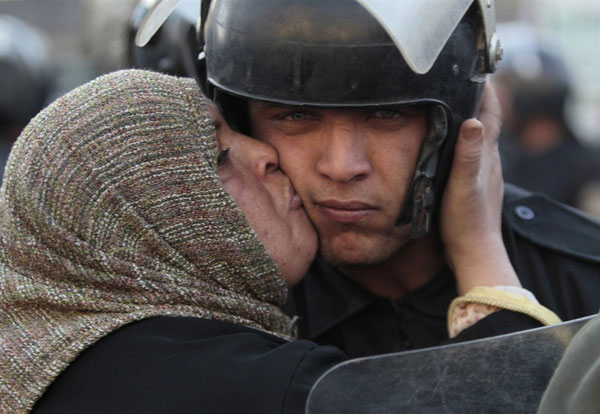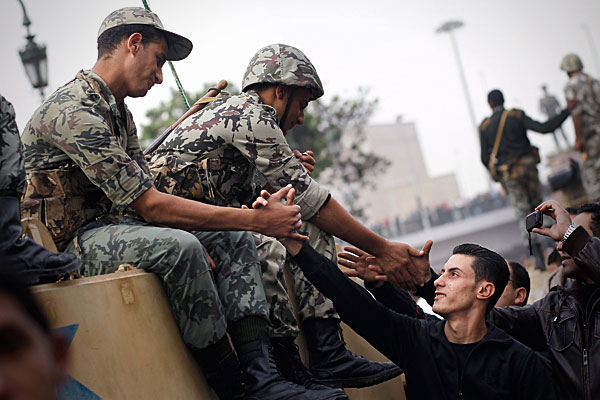
protester and riot policeman, Cairo, Friday, January 28, 2011*

protesters and soldiers, Cairo, Saturday, January 29, 2011
NOTE: This post was composed just after 6 pm today, Wednesday; since then (it's now 11 pm in New York) its thesis has become reality.
So what is the story? Will it be kisses and handshakes?
The police, uniformed or plainclothes, have largely been discounted as a significant factor in how the events in Egypt will unfold, although that story is still to be told, but the position of the army is definitely not yet resolved. To me it's looking more and more like the army is working toward the same end, although not to identical purpose, as what passes for the Mubarak regime right now: Every president of Egypt since King Farouk was overthrown in 1952 (by generals) has been a high-ranking army officer. Whatever their relationship may have been before last week, the upper echelon of the military is presumably no longer fully vested in Mubarak. Yet it's unlikely that it would want to see their general-in-a-striped-suit completely disgraced; an orderly departure of an old comrade would almost certainly be preferred.
Here's my further argument:
The officers are more likely to prefer Suleiman to the unknown that's represented by what surely looks to them as a still-leaderless mob, and in fact they may themselves have created his new vice-presidential office as a transition device, although not a transition to democracy.
The fact that the army is not fighting the protesters in Tahrir or elsewhere should not be taken as clear evidence of its indifference to the outcome; in fact it may be part of a cynical plan shared with the Mubarak administration (and possibly Obama's as well): Extended, and even increasing, chaos in the streets just may look to them like an opportunity for the restoration of order, under the authority of more or less the same interests which made up the old regime (and those of Washington).
Even the army rank and file, conscripts said to be unlikely to want to fire at the protesters, might come around to an accommodation with some kind of crackdown. This would especially be likely if they and other Egyptians come to look upon the revolutionaries, their numbers reduced by fear and attrition, as the enemies of Egypt.
Win-win: Everyone saves face; everyone saves power. The people? They never had it, and look what they would do with it if they did.
Last week I watched spellbound as Egyptians did what no one thought possible. I thought removing Mubarak was a done deal, and that the world, or the best of the world, wished them well.
I think I was mistaken. It now seems that the revolution is alone.
Today I realize how very much more will still be demanded of the heroic defenders of Egypt's ancient honor, and future greatness. I wish them well; I wish us all well.
*
For a discussion of this image, see Garance Franke-Ruta in The Atlantic, "Why the Kiss Picture Is So Radical."
[first image from Greenerblog (Lefteris Pitarakis / AP); the second image from CNBC]